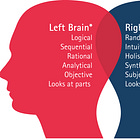An autopsy of the dialog - part one
The title of this post is not a mistake. Even though it is ‘the’ autopsy of some dialogs, I would not share it with you if they were not such perfect examples of what is going on in ‘THE’ dialog between the left and the right. The dialog at this point is pretty much dead, and there are many ways to dissect it. Mine is just one attempt. Doing it feels very much like the situation in the picture above – as if I was dissecting something from another world.
A scary thing happened to me the other day. I hesitated before posting a link to a YouTube video on my own Facebook page. An old friend from another life whom I reconnected with a few years ago, commented on something I shared on my Facebook page. I shared the video because I found it both funny and informative. It was making fun of the internal divisions of Islam. It is describing what some Muslim groups are saying about some others to justify calling them apostates. …..and we know what is the punishment for apostasy in Islam…….. My friend’s comment was: “I just deleted an acquaintance because of his regular anti-Islamic incitement.” “Did this qualify as incitement?” – I asked. “Yes”, he answered. The essence of the rest of the short conversation was his last comment: “The threat is not Islam, but religion.” I was a bit incensed by the thinly veiled warning, but….whatever. A few days later, I wanted to share a Pat Condell video on my page, but I hesitated in a clear case of self-censorship. Although I agree with everything he says, I would probably try to be more subtle myself. My momentary hesitation quickly turned into indignation. The last time I had to watch whether or how I speak what I think was before the fall of the wall. What scared me was the thought of self-censorship. And this was just the latest example. In the past few months I had about half a dozen conversations in different parts of the world that bore an eerie resemblance to each other. I am not the first to notice that something is wrong with the dialog. I am also not the first to suspect that something more is going on than the actual differences of opinions on any particular subject. The pattern is too obvious, too predictable to be accidental. The point of this post, however, is not the nature of those differences, but the nature of our apparent inability to resolve them. I firmly believe that having constructive discussions are the only civilized way to resolve our differences. I am always ready to have one and hardly ever walk away from it. If I do, I only do it out of desperation, when it is clear, that the conversation isn’t going anywhere, when I cannot get answers to my questions or counter-arguments to the ones I make. I only walk away after the other side disengaged. As I am trying to hang onto these dialogs, my efforts always bump into the same walls. It is truly fascinating how the same themes, clichés and attitudes repeat themselves across countries, cultures and languages.
What I encountered
Denial of reality
Ignorance (both active and passive) Having no actual knowledge of the facts behind the subject discussed and the refusal to answer questions and address concerns when they contradict beliefs and assumptions.
Cognitive dissonance (and the refusal to address it)
Selective memory and selective concerns
Deep, pervasive hypocrisy, misdirection and avoidance
The persistent refusal to take responsibility for past mistakes
Arrogant self confidence
Insulting ad-hominies
Patronizing condescension
The one I find the most difficult to handle is the refusal to answer questions. In almost all of my conversations I feel as if I was in a scene of Buñuel’s “Exterminating Angel.” I ask an easy but discomforting question and I never get an answer. This is what ends most of my conversations. I asked a genetic scientist a simple question: “according to the present state of our medical knowledge, is it possible to turn a biologically functional female into a biologically functional male, or vice versa?” I never got an answer, not because it is a difficult one, but because it is so obviously simple. The ‘no’ answer would concede my point that gender reassignment is just an elaborate pretension. Once that determination is made, we could still have a conversation, but the dogma, that it is all just a matter of personal choice, cannot be hold onto. That is why the simple answer cannot be given. The flat-out rejection of evidence without offering contrary evidence does not help the dialog either. When I say “according to [source ‘A’] only x% of migrants found work within two years and according to the projections of [source ‘B’] only y% will find a job within the next five years”, the answer is simply “That’s not true”. I was told time and time again that my sources are not reliable when I was quoting government statistics. The left’s ability to live with cognitive dissonance seems to be limitless and it creates a problem with communication if it cannot be addressed. The typical response to pointing out contradictions is to switch the subject. The second set of problems I encountered (selective memory, hypocrisy and the refusal to accept responsibility) are mostly moral failings. Seeing them tends to fill me with indignation, but they are not the dialog killers. Neither are the insults, the arrogance and the condescension. I have thick skin and I mostly find them funny. I see them as confirmations of my arguments. Let’s take a quick look of some of the things I heard and learned from my fruitless discussions:
What I was told
I was told (many times), that I am a racist, even when race was not the subject of the conversation.
I was told that IQ is irrelevant, that it does not even exist or definitely cannot be measured, and even if it did there are definitely no differences in the IQ of ethnic groups, or God forbid, races.
At the same time, I was also told that IQ should not even be measured, because that is racist.
I was told that there are no differences between man and women, but we can differentiate at least sixty genders.
I was told that homosexuality (a behavioral preference) is immutable, but gender can be freely chosen at any time. It is biology in one sentence, socialization in the next, personal choice in the third and I am a racist, homophobe cisgender pig if I ask them to make up their mind which.
I was told that women are just as capable as men, and also that ability has nothing to do with success. If women are not as successful as men, it is because men are oppressing them. Being an oppressor is not a difference, I guess.
I was told that the male/female wage gap is a serious problem despite a number of studies clearly showing that the gap is bogus.
I was told that all cultures are the same; all religions are the same; all races are the same, except, of course, western culture, Christianity and the white race which is responsible for all past, present and future ills of the world and therefore it does not deserve to live.
I was told that there is no reason to worry about Western civilization, because uncontrolled and unlimited third world immigration will not change it. All people are the same, no go zones do not exist and talking about an increase of rape is just propaganda.
I was told that my concerns about government debt are ridiculous.
I was told that standing up for self determination (as in Brexit and the Catalan referendum) are childish and irresponsible.
I was told that principles (such as the rule of law) do not matter because politicians are corrupt anyway (I am still looking for the logic in that one.)
And this is just a small sample, the full list seems to be endless, but not without patterns.
What I have learned
I learned that the left has an exceptional world view. The exceptions, the things that are missing from it are reason, morality and decency. What they DO have is infinite contempt for anybody disagreeing with them. Anything the left believes, it believes with religious fervor, and once something is a matter of religious dogma, it is beyond the realm of rational discourse. The left believes that:
Reality is infinitely malleable
People are malleable, and everything they are is the result of socialization. Except when it is a choice.
Facts can be ignored, evidence doesn’t matter, logic is irrelevant.
The essence of morality is good intentions and the decisions based on them.
The goals based on those intentions justify any means, no matter how unsavory.
Good intentions not only justify any means, they also excuse even predictably bad results.
The only possible causes of the poor results of their well-intentioned plans are opposition to them by evil people or insufficient power and resources to implement them. NEVER a flaw in the plan.
The greatest impediment to create an earthly paradise of equality and a caring society is the political opposition to these noble goals by racist, sexist, xeno- and homophobic fascists that could only be described as deplorable.
What could explain it?
What makes the attempts of any dialog so fascinating is that it is hardly ever about its particular subject. It is almost always about some righteous delusions of the left on the one hand and defending pragmatism against accusations of bad intentions on the other. The left sees its ideas, all of them, as moral because they have ‘moral’ aims. When they are confronted with the obvious limitations of their ideas, their reaction is to question the aims of their critics. With an increasing frequency, the questioning is skipped, and nefarious aims are projected onto their opponents. Leftists refuse to allow logic or contrary evidence to get in the way of their ideas as they believe that the world should be seen not as it is, but the way they wish it to be. It all started with Marx and his most famous quote: “The philosophers have only interpreted the world in various ways – the point however is to change it.” With this quote Marx proclaimed the primacy of intentions over (as it turns out) everything. The second element that makes conversations with the left difficult is also Marxist in origin. The idea that the power of man to change its world is limitless. What seems to derail every one of the conversations I am getting into is this refusal to accept reality as it is, as something we need to understand, as something that we have precious little power to change. The differences are clear, the question is the cause. What could explain this rift in the public discourse? I will try to answer that in my next post.
Like everything else on Substack, this is a reader supported publication.
You can help it by following or subscribing.
You can engage with it by clicking on like and/or commenting.
A ‘like’ costs nothing but it is worth a lot.
You can help this Stack grow by sharing, recommending, quoting or referencing it.
You can support it by pledging your financial support.
Any and all of it will be much appreciated.






